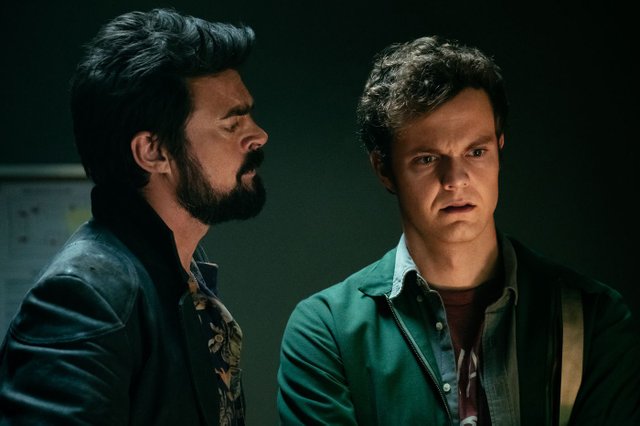Genre: Superhero/1 Hour TV Drama
Premise: (from Wikipedia) In a world in which super-powered “heroes” have become commonplace, they are syndicated, monetized, and marketed by a company called Vought International. Unfortunately, money and privilege corrupt, and many of the “supes” give in to their darker impulses. A clandestine group of normal-human vigilantes then arises to counter the corrupt “supes.”
About: Eric Kripke, coming over from Supernatural, has teamed up with Seth Rogen, Evan Goldberg, and Amazon, to bring this best-selling comic book to the HD screen. Amazon is fast moving away from artsy-fartsy shows (they cancelled Forever, The Romanoffs, and Nicolas Winding Refn’s Too Old to Die Young) to focus on big-budget fare. They love their Jack Ryan series, are putting together that Lord of the Rings show, and The Boys doesn’t look cheap either.
Writer: Erik Kripke (who’s working alongside Seth Rogen and Evan Goldberg) (based on the comic by Garth Ennis and Darick Robertson)
Details: 1 hour show, 8 episodes, on Amazon Prime
The Boys is a reminder of just how difficult it is to write a good TV show.
A couple of years ago, I said to everyone, “Don’t write traditional super hero stuff. Come up with ideas that involve superheroes in non-traditional ways.” Since then, the industry has moved squarely in that direction, trying to leach off of the superhero box office boom any way it can. We saw a couple of pilots about cleaning up after mass superhero destruction (neither succeeded). We got that spec script about a group of criminals who pull a heist on a superhero’s lair. There’s Legion, which I’m pretty sure is a superhero-adjacent show. And Agents of SHIELD, which has managed to stay on the air somehow.
Well now Amazon has introduced The Boys, about a group of superheroes who SEEM like the smoothest greatest coolest things since sliced bread. However behind closed doors, they’re a bunch of toxic, evil, manipulative, deceitful scumbags.
The story follows two main characters. There’s Annie, aka “Starlight,” a superhero who’s just made it to the big time. She’s joining “The Seven,” the biggest superhero group in the world. However Annie’s world is rocked when her childhood crush, Aquaman-like superhero The Deep, forces her to perform a sexual act on him.
And then there’s Hughie, who’s deeply in love with his girlfriend, and who, after getting out of work one day, is staring her in the eyes, only for her to turn into a big blob of goo. 200 feet down the street, he sees Flash-like superhero, A-Train, come to a stop, covered in the blood of his beau. Oops, he accidentally ran into her while running 10,000 miles an hour. Hughie watches in shock as A-Train shrugs and runs off.
Annie must quickly decide if this group of people she’s aspired to join her entire life is worth its ugly underbelly. It doesn’t help that her mom has groomed her for this and would hate her if she gave up. Meanwhile, Hughie tries to find justice for his murdered girlfriend but unfortunately the government and the superheroes are in lock-step. They tell him superhero collateral damage is an unfortunate part of keeping the city safe. Oh, but here’s $45,000 for your trouble.
Not long after that, Hughie gets a visit from a rough-and-tumble FBI agent named Billy Butcher. Billy says he sympathizes with Hughie’s situation and maybe they can help each other. He wants Hughie to use his girlfriend’s recent death to get into Vought International (the superheroes’ skyscraper), then plant a bug underneath their conference table. Unfortunately, Translucent (who has the power of invisibility) sees Hughie do this, and follows him and Billy back to Hughie’s work, where he attacks them. Will he succeed? Get Amazon Prime to find out!
The Boys is a frustrating show. At times during the pilot, you see the potential there. Other times, they make baffling choices. A-Train crashing into and killing the girl was a great inciting incident. What superhero fan hasn’t thought about that? That someone with super speed might occasionally bump into someone. And when you bump into someone at 10,000 miles an hour, it ain’t gonna be pretty.
The mythology is clever as well. In this universe, superheroes are like NBA athletes. They get shoe deals, cereal deals, their faces plastered all over billboards. Not only that, but Vought International is a privatized business. When your city’s crime rate goes up, Vought calls you and says, “We’ll offer you Superhero #11 for three years for 300 million dollars.” All that was great.
But then there’s the sleazy superhero sexual stuff, which felt a little tone deaf in today’s Hollywood. In the second episode, Starlight has to go on a mission with The Deep, and I thought, so we’re just going to follow these two as a team even though he sexually assaulted her? I get that we’re approaching these superheroes through a realistic eye, but you can still be judicious about how slimy you get.
Then there was the sloppiness of the plotting.
Here’s how I look at plotting. There’s three tiers. There’s the Bottom Tier. This is where you can feel the writer actually coming up with ideas as he’s writing. Typically you only see this in amateur writing and really bad straight-to-digital movies. But it can also pop up in sequels where they were rushing and didn’t care about the quality of the film so much as meeting a release date. Pretty much the entire last Indiana Jones movie would fall into this category.
On the flip side of this, you have the Invisible Tier. This is when the plotting is so invisible, you aren’t aware of it. The scenes don’t feel like a writer stuffing all the information they need into the scene to move the story forward. Rather, it just feels like you’re watching people’s lives. Characters never sound like they’re setting up important plot points or dishing out exposition. Eighth Grade was a good example of this. Nobody’s going to watch that movie and think, “The plotting was so obvious!”
The majority of plotting, however, exists in between these two extremes, in the Middle Tier. This is when writers are good enough to hide the majority of their plot points. But there’s an inherent lack of effort to want to get it right. And these writers are stuck in the middle for that reason. Because they’re not willing to do the extra work to make the plot in their movies or their TV shows completely invisible.
So what am I talking about?
Well, there’s this sequence in the pilot of The Boys that’s low Middle Tier plotting. In fact, it’s borderline Bottom Tier. Billy Butcher comes to Hughie with a plan to bug the superhero conference room. He tells Hughie, who previously rejected the 45,000 dollar compensation from Vought International for killing his girlfriend, to go back and say he’s willing to accept it. Then, while he’s there and they’re signing the check, slip the bug under their conference table.
Okay, let’s think through this here. Vought International’s building is 70 stories tall. The Seven’s Conference room, where they talk about superhero stuff, is on the top floor. In what reality would the business division of Vought International bring a random guy up to the most exclusive room in the world to sign a check? Wouldn’t they have some other room to do this in considering there are hundreds of rooms in the building?
So why then, do the writers have it happen in the most important room? Because if it didn’t, then there could be no scene where Hughie places the bug under their conference table. That’s the plot point that’s driving this whole sequence. So the writers figured, even though it makes ZERO SENSE that they would do this check transaction in this room, we’re going to do it anyway because we’re too lazy to think of a better way to do it.
That, my friends, is Low Mid Tier Plotting. It’s just not good enough.
And here’s why that’s a problem. Because if that’s going to happen in THE PILOT – the script you have the most time to write – then how sloppy are things going to get in episodes 2-8? When you don’t have any time to write? Sure enough, we get to episode 2, and there’s this really boring A-plot where Hughie hangs out with Translucent, who’s in a cage, for the whole show. And that’s when I turned this off.
I think everybody is living in some fantasy world where because there are so many TV jobs, they don’t think they have to bring it. They can just coast. But the other side of that argument is that people have more options to watch than ever. And if your show drops the ball for even half-an-episode, they’ll never come back. Which is why there are 1000 shows on TV yet people have only heard about five of them. So if you want to be one of the invisible shows that people hear about when it first premieres because of the promotional campaign and then never hear from again, go ahead and be as lazy as you want. But if you want something that’s going to make an impact, lazy plotting will be your downfall.
It’s too bad because the mythology to this show is really cool. And that’s what I responded to. I’m guessing that’s why the comic book is so beloved. But the show itself is messy. And that’s inexcusable.
[ ] What the hell did I just watch?
[x] wasn’t for me
[ ] worth the stream
[ ] impressive
[ ] genius
What I learned: One of the best movies ever to watch when it comes to hiding plot is Back to the Future. Specifically, watch the scene where Doc first explains to Marty how the time machine works. The scene conveys around 20 important points for later in the movie. And yet you don’t notice one. That’s because the scene is framed as Doc needing to document the time machine for science (which is why Marty is recording with a camera) combined with his utter excitement about his creation. It’s truly genius stuff.




